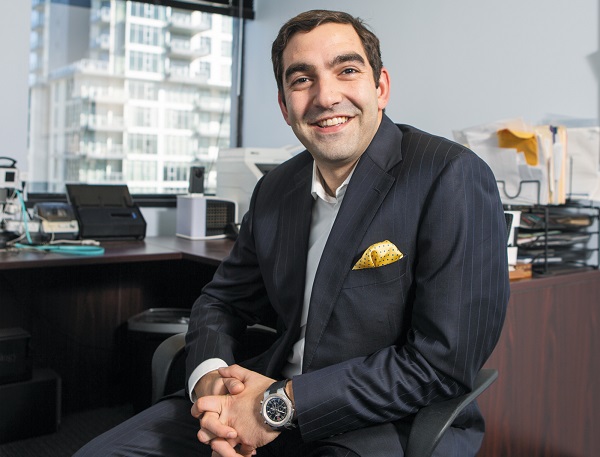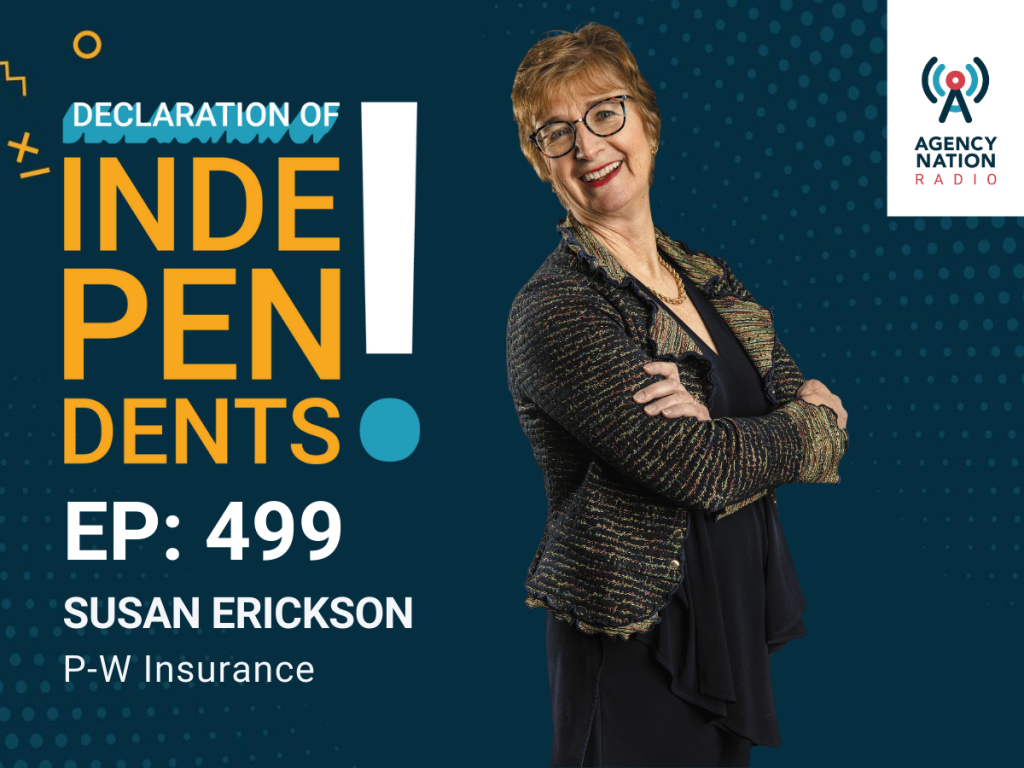Best of Both: What Young and Veteran Agents Can Learn from Each Other

By: Will Jones
Two years ago, Fayez Kabour (pictured below), 31, managing partner of Prince Financial & Insurance Services in Long Beach, California, opened the doors to his own independent agency.
After starting his journey in insurance with spells at Mutual of Omaha and Prudential, he is a self-professed “life-health guy,” who is now focused on growing his agency and “taking care of his clients on an all-round basis,” he says.
Kabour gives his mentors “a lot of credit” for his success. “I had two really good mentors. They were both much older than me, but they took me under their wing and taught me a lot,” he says. “We had a great relationship. We always went to dinner and I’d talk to them every day. We’d have sales calls and concept calls to talk about what’s worked and what they’ve seen fail in the past.” However, “it’s hard for people to find that mentor that they like as a person and friend, not just a manager,” he adds.
Kabour, whose parents are Syrian, was fortunate to find a personal connection with one of his mentors, who is also a “Middle Easterner” and is now CEO of one of the oldest and largest mutual insurance companies. “I was able to relate to him. A mentor that you like, someone that you’re comfortable with and someone who really becomes a friend is key when you’re starting out in insurance,” he says. “Mentors are huge. If I didn’t have my mentors, I don’t think I would have made it where I am today.”
 New Tricks
New Tricks
Mentorship gave Kabour an appreciation of the value that sharing knowledge and expertise has on a more inexperienced person’s career, as well as the industry in general. But what do the older generations need to learn from the likes of Kabour about running a successful agency?
The biggest gripe Kabour had during his time in corporate insurance concerned compensation, which is something he’s been able to remedy now that he’s an agency owner. “I didn’t like the [compensation] structure,” he says. “The people who are doing the work should get paid the most.”
“For example, if you close a deal with a $100,000 commission and only get paid 15% of that while all the other guys above you in the chain just have their feet on the desk and collect 10%—that’s not right,” Kabour explains. “I want my agents to make money, feel good and succeed. Not all younger agents are entitled, but they do need to be financially rewarded or just given that pat on the back, which isn’t really done in this industry.”
Generation Gap
When Joe Patrick joined his father’s agency after working as a commercial underwriter with Cincinnati Insurance for three years, he was in for a shock.
“There were five agents who were all over 60 years old. They gave me a cubicle, a pad of paper and said, ‘utilize your CSRs and go out and write business,’” recalls Patrick, now president of McCord Insurance Agency, Inc. in Cincinnati, and Wilson & Shanesy Insurance Agency, in Dayton, Ohio. “It wasn’t quite the introduction to the agency side that I needed. I needed to be groomed but they didn’t know how to bring somebody on… they’d never done it.”
After a year, Patrick realized that his father’s agency wasn’t the best fit for him and his ambitions. He eventually bought an independent agency through a contact he made at the Big “I” Legislative Conference and ten years after that, bought his second agency and consolidated them.
However, Patrick’s experience at his father’s agency wasn’t a total loss. He places immense value in the experience that younger agents can glean from the older generation. “They’re much better at the feel, the touch and all the intrinsic things in the sales process,” he says. “The newer generations are relying too heavily on the technology and using it as a crutch instead of a resource. It’s still a relationship business, which is a big part of what makes the insurance industry tick,” Patrick adds.
Nurturing Talent
In contrast, Scott Nesbitt, chief operating officer for Petra Risk Management Services in Birmingham, Alabama, went into business with his father—and it worked. However, instead of remaining in commercial production as he had in previous roles, Nesbitt assumed an operations position, which has meant overseeing seven agency acquisitions, as well as implementing recruiting, hiring and training processes.
Since the agency was founded four years ago, “we’ve experienced a tremendous amount of growth and we want that to continue,” Nesbitt says. “But in the future, we don’t envision that growth will come through acquisition, we think it will come through producer recruitment and development.”
The overall success rate of producer hires in the insurance distribution system is 56%, according to Reagan Consulting’s 2015 Producer Recruiting & Development survey. “Considering that the minimum investment for a new producer is $250,000, if we can develop producers at a higher level than 50%, that would be a gamechanger,” Nesbitt says. “That’s often the difference between the agencies that are actively growing versus the ones that are more stagnant.”
To do that, Petra pays attention to two aspects of their recruitment: Identifying the right candidates and developing producers. They filter for candidates with personality tests and other exercises, which “demonstrate how serious they are and whether they have the skills to be successful,” Nesbitt says.
“Once we bring a producer on board we focus on developing their skills to get them to a point where they can go out and be effective at a high level,” Nesbitt says. “I think now more than ever there are resources available to help implement that, especially through the Big ‘I.’”
“Successful agencies do a better job of finding the right candidates than other agencies. They also understand that sometimes, that takes more time to accomplish,” Nesbitt continues. “If you bring in the right people and really take the time to develop them and are intentional about that, you’re going to be much more successful.”
Work-Life Balance
One of the main factors contributing to the low success rates of new producers is burnout. Now that businesses are more connected to their clients than ever, the expectation that a producer must attend to every client’s beck and call is often irresistible. The issue is further exacerbated by sales targets and an individual’s personal will to succeed.
Older agents are used to a 9-to-5 workday, maybe the occasional evening or weekend phone call or appointment, explains Patrick. “Nowadays, I’m in front of the TV with the family at night and I’m often getting texts or emails from clients and companies”
“Younger agents can get so wrapped up in their clients’ instant communication expectations that it becomes somewhat overwhelming. Being available 24/7 is both a blessing and a curse. As younger people enter the industry, older generations and managers need to help identify that and manage these stresses to help eliminate the burnout.”
For millennials and younger agents in general, accommodating a healthy work-life balance means acknowledging that they have different goals and aspirations, inside and outside work, to someone in their 60s.
“They want freedom. They want to be able to do things. They want to get involved in their community, they might want to go to their kid’s baseball games, which all means that they might want to take more time off,” says Dan Riley, executive vice president & CEO of the Minnesota Independent Insurance Agents and Brokers Association. “The older generation just wasn’t brought up that way.”
“I personally had a hard time letting people work from home when they didn’t want to fight the traffic. But that had to change because I was forced to,” Riley admits. “Otherwise, we wouldn’t have the young people working here to survive.”
Technology
When it comes to independent insurance agents and technology, it’s true: “It’s hard to teach old dogs new tricks,” Riley says. “A lot of our members are in their 60s, they’re very successful, they know the technology is there, but they tiptoe around it.”
“They really do need to embrace the technology that’s out there,” agrees April Goodin, director of operations of the Minnesota Independent Insurance Agents and Brokers Association. “Many agents are too comfortable. Maybe they’re doing well, maybe there’s not enough competition to get them going or maybe they’re just too comfortable at the level that they’re at. But if they don’t take steps to try and grow their business, they’re going to get gobbled up.”
Incorporating technology doesn’t necessarily involve staying on the cutting edge of the latest office tech: “You just have to stay current,” says Maigen Chastain, personal lines assistant at Brownrigg Insurance Agency, Inc. in Marshall, Texas, “and it’ll help you work smarter, not harder.”
Simply staying up to date is something that Chastain appreciated when Brownrigg purchased another agency. As the employees from the acquired agency moved over to Brownrigg, Chastain noticed they were still using a paper-based filing system. “Going over to the filing cabinet, pulling out the paper files and leafing through them takes a lot more time,” she says. “Because our society is getting more reliant on information, we want answers instantly and technology is something that needs to be utilized.”
The options for what type of technology to adopt are endless, and that can be an overwhelming prospect. But if Chastain had to offer one single piece of advice to older, technologically challenged agents, she’d say this: “When somebody contacts you for their insurance needs, just mirror how they contacted you,” she says. “If they email you, don’t pick up the phone and call them, email them back. That’s how they’re preferring to reach out to you, so reach back out to them in the same way.”
There is no doubt that the older generation of agents want the next generation to succeed, to take over their agency and be as successful as they were. However, they often fall into the trap of offering the same road map to success that they used, Patrick explains. “Instead of saying, ‘Draw your own map and let’s get to the same conclusion.’ They look at our map and say, ‘You’re doing it wrong. This is the map I used, and this is what works,’” Patrick says.
Change is never easy, “but what do you have to lose? You can always go back to the way you were when you were comfortable and successful,” Kabour says. “If you don’t try, you’re never going to know. Like Michael Jordan said, ‘You miss 100% of the shots you don’t take.’ So, if there’s a new opportunity or a new strategy, it might work out really well for you, but you’re not going to know until you give it a shot.”
“No one is trying to take away from these older agents’ success. I’m just saying let’s make it even more successful,” Kabour says. “It’s always scary to try new things or to change, but once you get that ball rolling, then you can start to run with it.”
Will Jones is IA senior editor.











